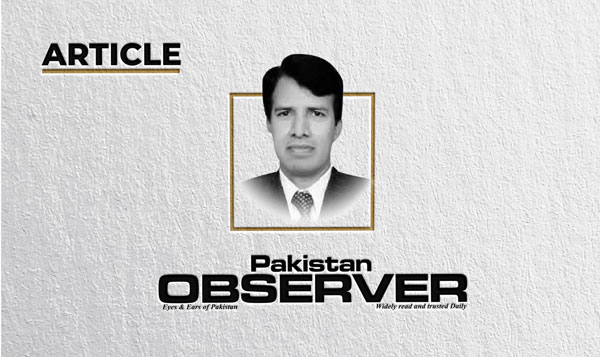The minorities in Pakistan
IN the contemporary world, Pakistan is a unique country where people from various religions, different castes and creeds and diverse ethnic backgrounds have freedom to live as per their beliefs and cultures.
This right of freedom to live and express is embedded in the Constitution of Pakistan. The basis of the constitutional provisions are derived from the vision of Quaid-i-Azam Muhammad Ali Jinnah, the founder of Pakistan.
Article 9 of Constitution of Pakistan provides a comprehensive coverage for the safety and security of its citizens.
The Constitution also laid down the procedure of justice system, basic human rights and matters related to public freedom for all citizens of Pakistan.
A true interpretation of these constitutional provisions would reveal that minorities enjoy the same rights and freedom in Pakistan as Muslims.
This is despite the fact that Pakistan is an ideological state, which came into being on the basis of Two-Nation theory.
With such a massive and broad-based freedom for the minorities its constitution pledges, Pakistan can truly be called as an open, highly moral and ethical state.
In Pakistani state system, the minorities enjoy all sorts of rights and liberties as provided to Muslim population.
Quaid-i-Azam Muhammad Ali Jinnah was a great and visionary leader of the 20th Century. It was his visionary leadership which compelled Britain, the then colonial power and dominant Hindu leaders of British India to accept the demand for a separate homeland for the Muslims of the subcontinent.
The Quaid envisioned Pakistan as a modern democratic state, where every Pakistani can live with personal safety and security while enjoying religious freedom with basic civic facilities.
In his famous address, Quaid-i-Azam clearly said, ‘You are free to go to your temple, church or mosque’.
Regarding the conversion of non-Muslims into Islam, there is a misreporting about Pakistan.
The truth is that such incidents are less than 1% and that too in exceptional cases of isolation.
As per authentic data, 1169 conversion cases occurred since 2019 which include 88% Hindus, 9% Christians, Sikh, less than 1% and 2% Qadianis.
Among 1169 conversions individual conversions are only 17% while 83% are family and collective conversions.
Minorities in Pakistan are free to practise their respective religions. Minorities in Pakistan are free to practise religion.
Religious facilities in Pakistan are: 2652 Churches (1 church per 664 Christians), 732 Temples (1 temple per 2734 Hindus) and 167 Gurdwaras (1 Gurdwara per 55 Sikhs) exist whereas in the UK there is one mosque for 2249 Muslims.
In Pakistan, minorities are provided with equal rights to education, jobs and business opportunities (Reserve seats in Parliament, minorities in senior positions in bureaucracy, army etc).
Minorities have been given four reserved seats in the Senate of Pakistan, ten in National Assembly and have been provided proportional reserved seats in all Provincial Assemblies.
The National Commission for Minorities (NCM) has recently been re-constituted. The newly constituted NCM has increased membership of minority communities, who are now in majority.
Moreover, Mr.Chela Ram Kewlani, a member of the minority community, has been appointed as Chairman of the Commission.
There is an allocation of 5% Job Quota for minorities in all Federal Government Services, in addition to open merit.
On the directions of National Commission for Minorities, implementation status of job quota to be strictly observed by Provincial Governments, Federal Ministries/ Divisions, FPSC, Islamabad, however, due to lack of education etc, overall it is not being fulfilled completely.
Regarding teaching of Minority Religions at Primary Level; Single National Curriculum introduced at primary level in educational institutions.
Curriculum for seven non-Muslim communities (Christian, Hindu, Sikh, Kalash, Bahai, Buddhism and Zoroastrianism) has been introduced in consultation with faith scholars.
Many welfare measures for minorities have been introduced like endowment funds for minorities, minority students’ scholarships, provision of vocational education for children of Hindus and Sikhs at government expenses.
Apart from the interfaith harmony policy at the federal level, the Ministry of Religious Affairs has taken a number of initiatives to promote interfaith harmony, including declaration and celebration of Minorities Days, to recognize the contribution of religious minorities towards nation building, public holidays for minorities on their festivals of Holi, Diwali and Easter.
Besides, there is all facilitation being done for the minorities in Pakistan. Indeed, Pakistan is a unique country where people from various religions, castes, creeds and diverse ethnicities have freedom to live as per their beliefs, cultures and traditions.
This right of freedom to live and express is protected in the Constitution of Pakistan. The basis of the constitutional provisions are derived from the teachings of the Holy Prophet (PBUH) and the vision of the Father of the Nation, Quaid-i-Azam Muhammad Ali Jinnah.
The Constitution of Pakistan is the biggest safeguard for everyone in Pakistan which includes the minorities.
Besides, the people of Pakistan have love, respect and care for each other. As per Article 25 (1) of the ‘The Constitution of Pakistan’ “all citizens are equal before law and are entitled to equal protection of law.
” Article-5 of the Constitution provides “adequate provision shall be made for the minorities to freely profess and practise their religions and develop their cultures.
” There is no discrimination against minorities in the Constitution of Pakistani nor there exist any animosity against minorities at the level of Pakistani society.
Therefore, let’s not allow agenda-driven exploitation of the Pakistani State and society in the name of minorities. All Pakistanis are united and one under the Constitution of Pakistan-1973.
— The writer is Professor of Politics and IR at International Islamic University, Islamabad.










